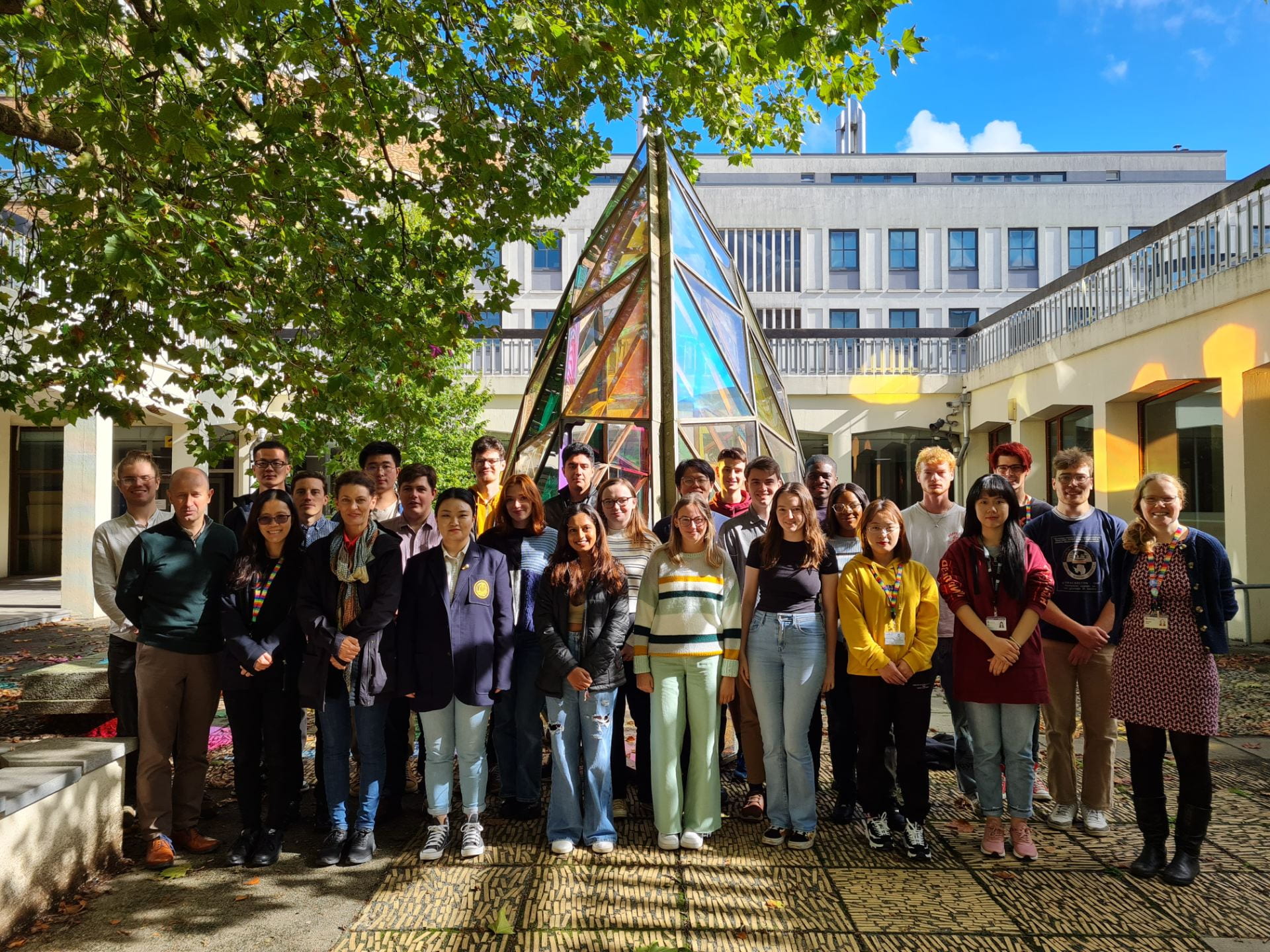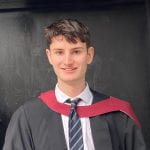2023-24 Cohort
Our fifth cohort of 22 students started their PhD studies in September 2023. Find out more about their interests and research projects below.

Phoebe French - Imperial College London

Supervisors: Dr David Green, Prof. Shiranee Sriskandan
Before starting the CDT programme, Phoebe completed her undergraduate studies in Biochemistry at the University of Reading. She developed an interest in bioaerosols whilst on industrial placement with the UKHSA.
Her PhD will focus on developing an understanding of how pollutants and other environmental conditions affect the aerosol transmission and prevalence of Streptococcus pyogenes. This bacterial species is the cause of scarlet fever, a disease that has had a resurgence in recent years due to currently unknown factors.
Oscar Zhang - University of Leeds

Supervisors: Prof. Andrew Bayly, Prof. Peter Jimack, Dr Joseph Ghaffari Motlagh
I completed my undergraduate studies in physics in both Ireland and China. Subsequently, I pursued a Master’s in Material Science in the UK. Currently, I am working on applying Physics Informed Neural Networks (PINNs) to Computational Fluid Dynamics (CFD) models of aerosols and sprays. The aim of my research is to enhance CFD models with multiple particles present to capture the complex physics involved in drying and solid formation. These improved models will then be integrated into a CFD model of a spray drying tower, and their performance will be thoroughly assessed.
Charlotte Reston - University of Bristol

Project: Investigation of novel methods to study the survival of foot-and-mouth disease virus in aerosols
Supervisors: Prof. Jonathan Reid and Dr Claire Colenutt
My undergraduate degree was an integrated Masters programme in Virology and Immunology in the school of Cellular and Molecular Medicine at the University of Bristol. This involved working with influenza A, coronavirus 229E, Pneumonia Virus of Mice, Respiratory Syncytial Virus, and SARS-CoV-2, investigating entry mechanisms into cells and RNA modifications to genomic material.
Xiaojie Sun - University of Bath

Project: High-dose antibiotics inhalers for acute lower respiratory tract infections in primary care
Supervisors: Dr Bernardo Castro Dominguez, Dr Matthew Jones, and Dr Albert Bolhuis
Xiaojie completed her Master’s degree in Pharmaceutics from China Pharmaceutical University, where she developed research interest in Crystal Engineering, focusing on investigating the impact of solid-state crystalline forms on the properties of pharmaceutical formulations. After graduation, she pursued a career in industry, committing to exploring the influence of solution crystallization process of APIs on the crystal form, particle size and purity. Since strong interest in academic research, she decided to pursue her PhD.
Xiaojie’s PhD program at University of Bath will integrate Aerosol Science with Crystal Engineering to generate inhaled high-dose antibiotic micro/nanoparticles, suitable for the management of lower respiratory tract infections.
Xia Yi - University of Bristol

Project: Transmission of Bacterial Resistance Genes in Aerosols
Supervisors: Prof. Jonathan Reid and Dr Allen Haddrell
Xia worked on correlation analysis of cryptosporidium in calf bedding and calf diarrhoea during her undergraduate degree in the College of Veterinary Medicine from Nanjing Agricultural University. With a great passion for animal health management, she got a master’s in the College of Veterinary Medicine from China Agricultural University which she focused on the effects of dietary fibre on the intestinal health of preweaning calves and investigated the Antimicrobial Use and Antimicrobial Resistance in Pathogens Associated with Diarrhoea and Pneumonia in Dairy Calves. Through 7-years of veterinarian study, she has an appreciation that disease prevention takes precedence over treatment in ranch animals’ health management and the importance of zoonoses to humans and animals. So this led she wants to study the transmission of pathogens in aerosols, to contribute to the ranch animals’ health and the public health simultaneously.
Xia started a PhD in bioaerosol, where she will be characterizing the environmental parameters that related to gene transfer can occur in bacteria when contained in aerosol droplets, leading to AMR bacteria.
Toyosi Akande - University of Hertfordshire

Project: Dry water for future inhaled medicines
Supervisors: Prof. Darragh Murnane
I completed my undergraduate degree in Biomedical Science at the University of Brighton, and a master’s degree in biomedical research at Imperial College London. During this time, I developed an interest in the bioreactivity of inhaled particles on lung alveolar cells. This interest grew and made me apply for a PhD once I completed my master’s.
This paved my path to joining the CDT in Aerosol Science carrying out a PhD, where I aim to explore dry water formulations for drug delivery of biologics such as proteins, whole cells, and RNA to the airways.
Joseph Bainbridge - University of Manchester

Project: Chemical and toxicological properties of aerosol emissions subject to atmospheric processing
Supervisors: Dr James Allan and Prof. Gordon McFiggans
I graduated from the University of Nottingham with a Master of Science in chemistry, during which I developed an interest in atmospheric science which I decided to pursue through the CDT in Aerosol Science. My research project focuses on developing a protocol for the generation and quantification of secondary and aged primary aerosols using an oxidation flow reactor, applicable to a range of real-world sources. The chemical changes that occur and the toxicological properties of the aerosols will be studied and used to inform atmospheric chemical transport models and public health impacts of air pollution.
Nathan Croll Dawes - University of Bristol

Supervisors: Dr Bryan Bzdek and Dr Jim Walker
Nathan graduated with a master’s degree from the University of Bristol where he studied dynamic surface tension of aerosol droplets. He is now continuing his studies at Bristol where he will be investigating interfacial photochemistry through the development of a novel instrumental setup. In his spare time he enjoys climbing and mountaineering.
Zhuo Chen - University of Manchester

Supervisors: Prof. Martin Gallagher
My name is Zhuo Chen, a PhD student at the University of Manchester. My research interests are focused on the monitoring of bioaerosols and machine learning. My Phd topic is “ Combining state of the art real-time multi-technique optoelectronic bioaerosol spectrometry with neural network algorithms to discriminate, monitor and model different biological aerosol emissions from agriculture”.
Fraser Crawford - University of Bristol

Project: Ice nucleation in aerosols containing biomolecules
Supervisors: Prof. Johnathan P. Reid and Prof. Alison Rust
My name is Fraser Crawford, I studied an integrated masters degree at the University of Bristol doing chemical physics (graduated in 2023), and my project is on “ice nucleation in aerosols containing biomolecules”. Little is certain about the effects of clouds and aerosols on climate change, through studying the mechanisms of growth and properties of the produced aerosols, hopefully some of the knowledge gaps can be filled in.
My interest in aerosols, and my reasons for joining the CDT, come from a curiosity in the interface between physical phenomena, such as phase change, and chemical processes.
Ruaridh Davidson - University of Bristol

Supervisors: Prof. Johnathan P. Reid and Dr Michael Coterell
1. My name is Ruaridh and I’m a PhD student at the university of Bristol. My research will involve investigating the effects of particle shape, morphology and phase on their interaction with light. Specifically, we are interested in heterogenous particles containing an aqueous phase, 1,3,6 hexanetriol semi-volatile component and ammonium sulphate salt inorganic component. I will be investigating the partitioning of water into these two phases at varying relative humidities.
I studied chemistry at the university of Cardiff looking at solid state chemistry and photoelectrochemical cells for water splitting. Before that I studied Biological Chemistry and Drug Design at the University of Dundee looking at the role of GPCR55 overexpression in pancreatic beta cells and how this was related to incidence of type two diabetes.
Jamie Summers - University of Hertfordshire

Project: HYDRA: Hydrogels for Aerosol Capture
Supervisors: Dr Michael Cook, Dr Loïc Coudron and Prof. Ian Johnston
James graduated from the University of Nottingham in 2019 with an MSci degree in Chemistry, before working for the NHS and Siemens Healthineers. His project will investigate the use of hydrogels for aerosol capture to innovate sampling of airborne pathogens.
Patric Boardman - University of Bath

Project: Particle-surface adhesive forces and their role in resuspension phenomena
Supervisors: Dr Matthew Jones, Dr Paul DeBank, Dr Anton Souslov
My name is Patric, and I’m a PhD student at the University of Bath, modelling the resuspension of particles from different surfaces. This combines my interests of fluid dynamics and 3D modelling and has many relevant applications towards medicine and disease. Outside this I enjoy creating music for my band, graphic design as well as hiking and gaming.
Armin Markazi Omidvar - University of Manchester

Supervisors: Prof. Sheena Cruickshank, Dr Cyrill Bussy, Dr Martin Leonard, Dr Laura Urbano
I did my undergraduate degree in medical laboratory sciences in my country, Iran. I moved to UK to do my master’s degree in immunology and inflammatory diseases at the university of Glasgow and graduated with a distinction. following that, I worked one year as a research assistant at the university of Glasgow where we focused our research on mucosal immunology. my passion for studying mucosal immunology led me to my PhD at the university of Manchester, where we focus on the role of early life air pollution in developing respiratory diseases, such as asthma.
Anna Catton - University of Bristol

Supervisors: Prof. Jonathan Reid, Mr. Joe Takher-Smith (Viatris)
I completed my undergraduate degree in Chemistry at Swansea University. Throughout my undergraduate degree I completed a computational research topic where I produced some code to provide all the structural isomers of a compound and my dissertation topic was looking at finding the most effective inorganic solvents for increased hydrogen production from irradiating waste plastic. I then progresses onto an MSc by research programme in Chemical Engineering at Swansea University where I investigated the removal and degradation of some chemical contaminants from wastewater via advanced oxidation processes.
Nicolas Duthou - University of Bristol

Project: Data-informed modelling of aerosol resuspension under aerodynamic loads
Supervisors: Dr Alberto Gambaruto, Dr Karen Aplin & Dr Nick Zhang
Before enrolling in the CDT, I completed my Aerospace Engineering (MEng) undergraduate degree at the University of Bristol (2019-2023). I was particularly interested in programming, modelling and simulations, leading me to apply for the project proposed by Dr Alberto Gambaruto.
My project focuses on establishing an exhaustive description of parameters influencing the resuspension of particles. I am very enthusiastic about using state-of-the-art experimental and numerical approaches such as wind tunnel testing and CFD, in addition to machine learning-based models (PINNs) to predict resuspension behaviour.
Kexin Qiu - University of Leeds

Project: Aerosol emissions from future generation aircraft and their impact on climate
Supervisors: Dr Alex Rap & Prof. Ben Murray
Growing up in a city with severe air pollution sparked my interest in aerosol research. During my undergraduate studies in Earth Sciences at UCL, I became particularly interested in the climate impacts of aerosol emissions after studying the climate dynamics. On my final year, I conducted a research on whether the reduction of aerosol pollutions will accelerate global warming. Through this experience, I became aware of the significant uncertainties associated with aerosol-cloud interactions when assessing aerosol climate impacts. As a result, my current PhD project is dedicated to quantifying the indirect climate impact of aerosol emissions i.e., aerosol-cloud interactions from current and future aviation. This is essential for gaining a comprehensive understanding of aviation’s complete climate footprint and for designing more informed emission pathways to achieve the aviation industry’s ambitious net-zero carbon target.
Nan Zhou - University of Bristol

Project: Hygroscopic dynamics of solution phase aerosol on generation and inhalation to the lungs
Supervisors: Prof. Jonathan Reid & Dr Rachael Miles
Nan graduated from the Australian National University with a bachelor degree of Medical Science. Then he obtained a master’s degree in Pharmaceutics from the University College London where he developed a strong interest in drug delivery to the lungs. Thus, he decided to join the Aerosol Science CDT and the Bristol Aerosol Research Centre (BARC) to continue his research. For his PhD, he will be studying the effect of hygroscopicity on the stability of dry powder formulations. He is excited to contribute to the development of more effective and reliable drug delivery systems for respiratory conditions.
Anushi Khandare - University of Leeds

Supervisors: Prof. Catherine Noakes, Dr Louise Fletcher, Dr Marco-Felipe King
I completed my BS-MS (dual degree) from the Indian Institute of Science Education and Research, Bhopal, India in the year 2023. I majored in Environmental Sciences where my thesis focused on finding the oxidative potential of PM 2.5 in Central India. This was the time where my interest in aerosol and health developed. I would be working on optimizing the performance of air cleaning technology for mitigation of infection in hospital environments. The aim would be achieved by a combination of experimental study and computational modelling. Experiments will involve sampling and culturing microorganisms from the air and on surfaces, as well as real-time measurement of physical environmental parameters . Modelling approaches based on Computational Fluid Dynamics (CFD) will be used to simulate the interaction of the air cleaning device with the airflows and pollutant sources in indoor spaces. This will build on existing chamber airflow CFD models with a device model added to understand interactions between the device and room airflow and the capture behaviour for different size aerosol particles as well as chemical species in air. The combination of CFD and experimental data will be used to assess aspects such as performance characteristics, optimisation of controls and the effectiveness under transient scenarios.
Emily Winter - Imperial College London

Project: Bridging Across Scales for Contrail Impact Modelling
Supervisors: Dr Marc Stettler and Jey Williams (Airbus)
Emily attended the University of Bristol, where she studied Chemistry from 2019 to 2023. During her final year, she completed her Master’s thesis, titled ‘Effect of Varying Relative Humidity on the Drying Kinetics in Inorganic Aerosols’. This research was supervised by Professor Jonathan Reid with the BARC (Bristol Aerosol Research Centre) group. Her project focused on understanding the kinetics of individual droplets, which form the foundation for more complex atmospheric applications and further fuelled her passion for research.
Emily is currently pursuing her PhD at Imperial College London under the guidance of Dr. Marc Stettler. Her research is titled ‘Bridging Across Scales for Contrail Impact Modelling’. She aims to expand her understanding of fundamental aerosol processes to develop a comprehensive model for tracking the exchange of water vapor throughout the lifespan of contrails, both for single aircraft and for multiple aircraft in a region.
Ryan Hyde - University of Bath

Supervisors: Dr Adam Squires and Dr Anton Souslov
I studied pharmacy at the University of Central Lancashire and was due to get an MPharm in 2024 but I took the exit award of a BSc in Pharmaceutical Sciences in 2023 in order to pursue the CDT in Aerosol Sciences. My PhD project is investigating how much, and to what extent, two different aerosol streams exchange content after they collide with each other, and I’ll be undertaking it at the University of Bath as a part of the Squires Research Group.
Felix Dobree - Imperial College London

Project: Characterising alveoli-on-chip for better design of aerosolised drugs deep into the lung
Supervisors: Dr Jorge de Bernardino de la Serna
Chemistry graduate from the University of Edinburgh where my final year project was designing and synthesising peptide hydrogels. Currently, I am joining Jorges’ group to develop an organ-on-chip to model aerosolised drug action in the distal lung.

EPSRC CDT in Aerosol Science
University of Bristol
School of Chemistry
Cantock’s Close
Bristol, BS8 1TS
aerosol-science@bristol.ac.uk
Partner Newsletter
Sign up to receive monthly news and updates from the CDT in Aerosol Science, as well as events, training and research webinars.





